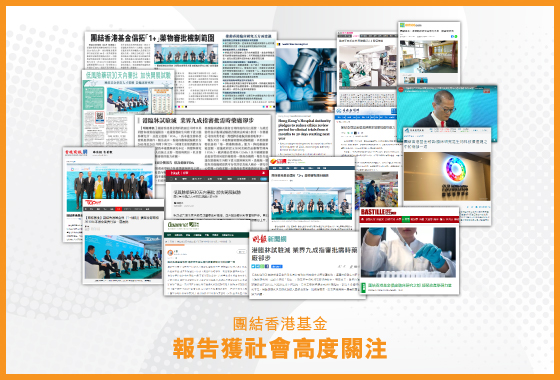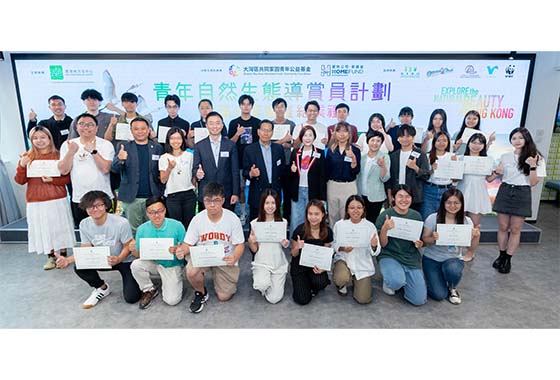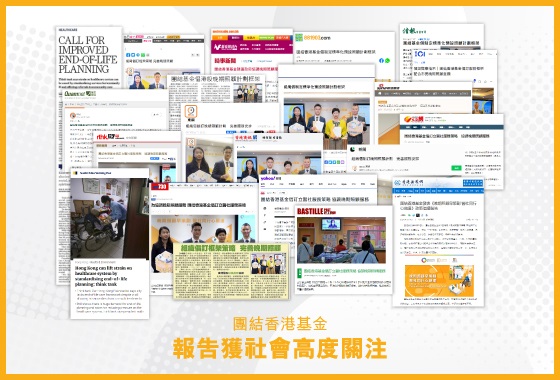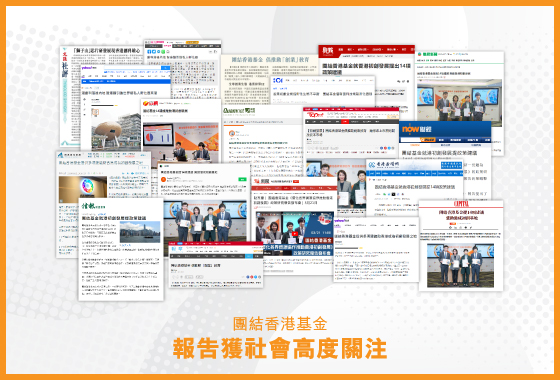20 Years of the HKSAR, and the Way Forward
Remarks by C H Tung at SCMP Handover Celebration Conference on 12 June 2017
Ladies and Gentlemen, good morning.
On the occasion of the 20th anniversary of our return to China, let us look back at what has happened since the handover, where are we today and also what the future may bring. By the end of my talk you may feel that I am overly positive, but the fact is there are good reasons to be optimistic.
A Review of the Past 20 Years
The successful implementation of the Basic Law
Let me first talk about the successful implementation of “One Country, Two Systems”. By any standard, implementation of “One Country, Two Systems” in Hong Kong has been successful. The rule of law, the free market economy, the international character of Hong Kong, as well as our way of life, have all been preserved. And, with the economy growing at an average rate of 3.3% per year over this 20-year period, our prosperity has been maintained.
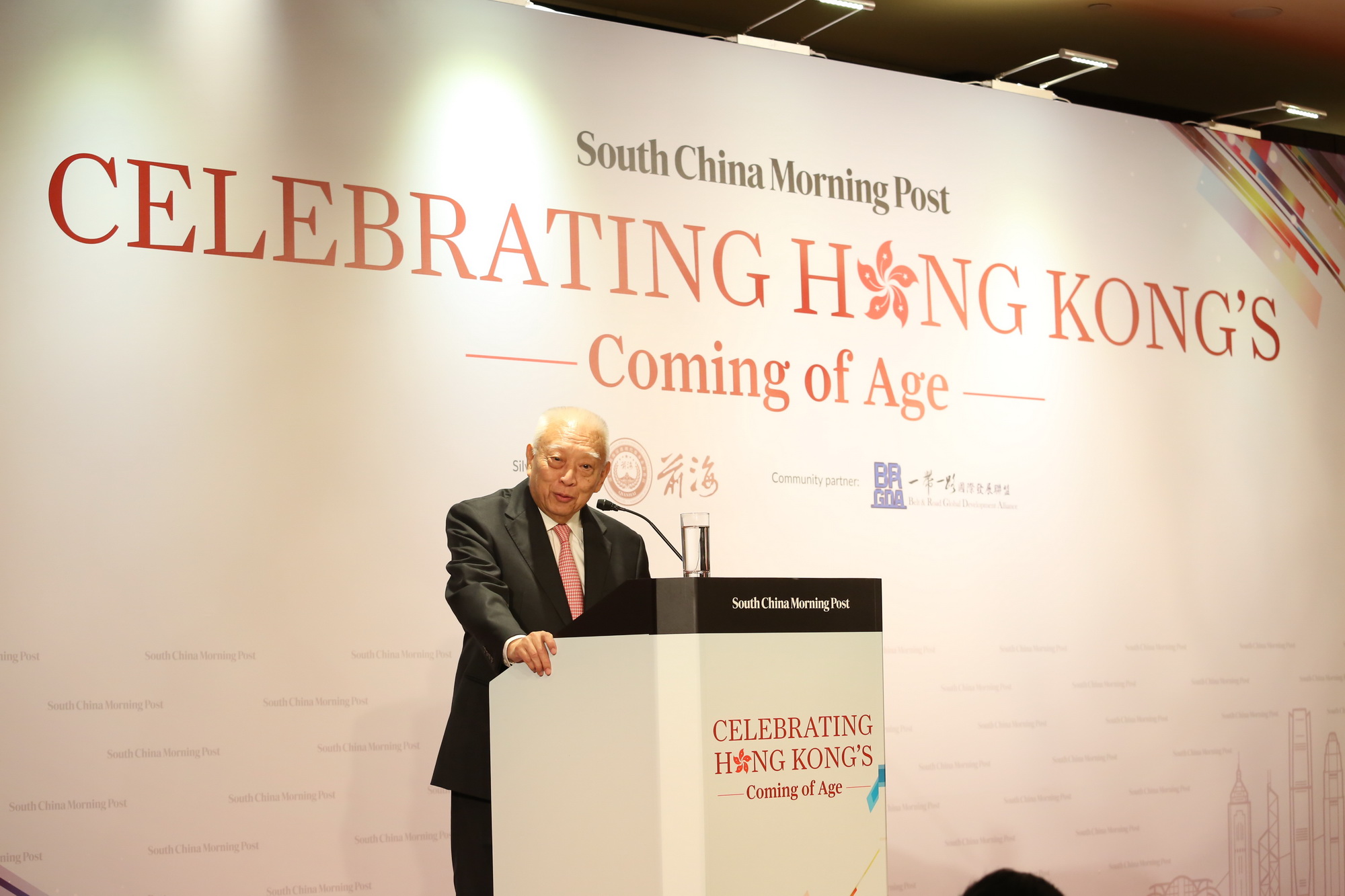
In this regard, I would like to quote for you some figures from Worldwide Governance Indicators, a report sponsored by the World Bank, and issued in October, 2016. This report rates individual governance indicators for 215 countries and territories. Hong Kong’s ranking rose in many key areas in the twenty-year period from 1996 to 2015. Under the category Rule of Law, Hong Kong improved from 60th to 12th. In Government Effectiveness, Hong Kong improved from 28th to 3rd. In Control of Corruption, Hong Kong rose from 20th to 17th. Lastly, on Regulatory Quality, Hong Kong improved from 4th to 2nd. The fact is, the successful implementation in Hong Kong of “One Country, Two Systems” is for everyone to see.
Successful implementation of “One Country, Two Systems” also provides enormous competitive advantage to Hong Kong in moving our economic and social agenda forward. Indeed, “One Country, Two Systems” has given us a set of competitive advantages that no other city in Asia can match.
One anecdote that I like to share: I met Prime Minister of Singapore Mr. Lee Kwan Yew a few months before Hong Kong’s return to China. We met from time to time in my personal life. He told me that Hong Kong really is very fortunate, and that he wished Singapore could enjoy the special privileges that came with “One Country, Two Systems”. Since then, a number of leaders of major cities on the mainland have also told me how lucky we are, and that they envied the competitive advantages enjoyed by Hong Kong by having the two systems.
From a national point of view, our success over the last 20 years in the implementation of “One Country, Two Systems” has given enormous pride to our people, because it is a brand new endeavor, and a great undertaking by a great nation.
Economic and Social Development Over that Period
Over the past 20 years, our GDP grew at an average annual rate of 3.3%. Taking into consideration the severe Asian financial crisis of 1997 and 1998, the SARS attack in 2003, and then again the global financial crisis of 2008, it is clear that we have done alright.
But we must acknowledge that we still face challenges in the areas of economic and social development. Globalization and the rapid development of new technologies have created a growing disparity between the rich and the poor. This is a common experience of many developed countries with free market economies. Hong Kong has not been able to escape from this phenomenon. This state of affairs has been further exacerbated in Hong Kong by the rapid rise in housing prices. As for the young people of Hong Kong, they not only have to face these high property prices, but also stagnation in upward mobility.
Ladies and Gentlemen, let us now turn our attention to the future.
China’s rapid economic growth is set to continue. Therefore, our strategy must be to better utilize our competitive advantages under “One Country, Two Systems” to diversify our economic base.
Hong Kong is a financial center, whose standing in Asia rivals that of New York in the US, and London in Europe. As China’s economy continues to grow, and, for that matter, as Asia’s economy continues to grow, there will be expanded opportunities for Hong Kong in the financial services sector.
For instance, China today is the largest buyer of commodities from around the world. Hong Kong could and should become a financial center for commodity trading, which is currently being carried out in London and Chicago. As the RMB moves toward internationalization, Hong Kong has an important role to play in that area as well. Other opportunities, such as the development of the RMB bond market, will come, as China’s economy continues to grow. It is up to us to make Hong Kong relevant to China’s future needs in these areas. The upholding of “One Country, Two Systems” has enabled us to maintain a very high standing in areas of the rule of law and the maintenance of strict regulatory regimes, which have the confidence of the international financial community.
Another example: before 1997, Hong Kong was often referred to as the Hollywood of the East. In those years, our film market consisted of Hong Kong, Taiwan, as well as overseas Chinese. At that time, the audience that we served numbered between 30-40 million people. Since then, the Hong Kong film industry has been in hibernation. But the good news is that, within one or two years, the Chinese box office market, with a population of 1.4 billion people, will become the largest in the world. With the advantages of CEPA, under “One Country, Two Systems”, the Hong Kong movie industry has a great opportunity for a renaissance.
Moving on, the One Belt One Road initiative offers Hong Kong new opportunities that have not appeared before. As an example, there is enormous capital requirement for infrastructure investment in many of the countries enroute. The initial stage of financing will most likely be made by the policy banks. But as the projects begin to mature, Hong Kong, as an international financial center of high standing, is well positioned to provide financing through IPOs or helping to raise long-term debt.
The other great new initiative of China is the construction of the Guangdong-Hong Kong-Macau “Big Bay Area”. This area is one of China’s wealthiest areas, where technology and innovation thrive, where the consumer market is growing rapidly because of a rising middle class, and where there is also a strong industrial base. As this plan evolves, the opportunity for Hong Kong is enormous.
The above-mentioned economic activities will accelerate our economic growth and will create new jobs. Many will be high-end service jobs. I’m confident that Hong Kong will be able to compete successfully in all these activities because of our competitive advantage under “One Country, Two Systems”. Let us seize these opportunities before us.
Now, let me highlight two other challenges Hong Kong faces, namely in the areas of housing and land supply, and education.
Housing and Land Supply
The first and foremost issue in every Hong Kong person’s mind is housing. We need to implement forward thinking housing policies that will provide adequate and affordable housing. To do that, we also need to overcome the shortage of land supply with urgency. It is estimated that over the next 15 years, 600,000 residential units have to be built, through a combination of the use of current land, and reclamation of land that still needs to be undertaken. This massive program will not only stabilize the housing situation, but also create jobs for all sectors of our economy. We also need to be mindful that the housing must not only be affordable, but living space must not be too small. Our people should live in dignity.
Education
In a rapidly changing world, and a rapidly developing mainland China, we need to better educate our next generation.
Specifically, in a world where technology is developing very quickly and deeply influencing all aspects of our lives, we need to teach our next generation a basic knowledge in computer science, physics, mathematics and engineering, for whatever career they wish to pursue in life. So far, our provision for this has been inadequate.
Throughout these 20 years, the Chinese economy has expanded very rapidly and very successfully. In 1997, the size of Hong Kong’s economy was about 18% of mainland China’s economy. But by the end of last year, the size of Hong Kong’s economy was only 3% of mainland China’s economy. The whole world has caught up to China’s successes and wishes to take part in this rising tide. We need to do the same thing. We need to have a sense of urgency to awaken our next generation to the enormous market right here at our doorstep. To do this, our young people need to understand more deeply about Chinese culture, as well as Chinese history, particularly what has happened over the last hundred and fifty years.
Unfortunately, our education policies have not been forward looking enough. Under investment in education as a whole makes the challenge we face today even greater. The lack of upward mobility of our young people, which we so often hear about in Hong Kong, finds its roots in the inadequate investment in education. We have to recognize that expenditure in education is really an investment into our future.
Ladies and Gentlemen, so much of what we should be doing. Many of my friends have told me that I’m too optimistic. Some of their pessimism is a result of their view of our society. We are too divided. We have too many vested interests that stand in the way. Our government bureaucracy is used to a market driven economy and cannot respond to other forms of development. Our fragmented legislature is too difficult for the government to manage. Too much biased and fake news have prevented people from seeing the issues clearly. And finally, where do we stand on elective democracy?
To all that, I would like to respond by saying that we may be divided, and it is only natural for an open society to have many different opinions. But, after years of stagnation, I believe that the majority of Hong Kong people wants us to move forward. An overwhelming majority is also in favor of “One Country, Two Systems”. Those who advocate independence or are against “One Country, Two Systems” have little popular support. Civil servants have been targets of blame and criticism. But I believe there are many competent and devoted civil servants who will respond to the voices of the people and to strong leadership. Even the legislature, I believe, will understand that most Hong Kong people are tired of all the filibustering, and seriously want to see a constructive and progressive legislature. As for the media, I keep my fingers crossed.
With regard to the development of democracy, we were given an opportunity to move ahead with universal suffrage in the first half of 2017, but, unfortunately, this was vetoed by the pan democrats. At present, the society is too divided to find a way forward. Indeed, in my view, our energy and focus should be on Hong Kong’s economic and social development under “One Country, Two Systems”. As I talked about earlier, we have no time to lose. It is important that we do this with single-minded purpose in the coming years.
To the young people of Hong Kong, I would like to say this: your future is right here in Hong Kong. Your future is with “One Country, Two Systems”. And if you have not already done so, you really need to begin to understand China’s history and culture, and what is now happening in China. Your commitment to Hong Kong and China will not only enable you to achieve your personal dreams, but also bring you the satisfaction of being part of something bigger and more meaningful, by joining Hong Kong in playing a role in China’s renewal.
I feel that change is in the air, and that finally there is reason to have optimism. The people of Hong Kong are tired with the negativity that exists within society today, and wish to move forward.
Before I close my speech, I want to take the opportunity to thank Mr C Y Leung who is here with us this morning. Thank you for your outstanding service. Thank you for your steadfast stand in protecting “One Country, Two Systems”. Indeed in the five years under Chief Executive C Y Leung’s watch, much effort has been made in the areas of land and housing, education, health care, science and technology, assistance to the disadvantaged, and the challenges brought about because of aging of our societies, etc. But we also have to recognize that for public policy to take effect, it will take time. Nevertheless, despite politically motivated resistance, foundation for progress has been made in some of these areas. To Mr. Leung’s credit, during his 5-year tenure, annual growth of median monthly domestic household income averaged 4.9%, as compared with a 20-year average of 1.8%.
As my speech draw to a close, let me tell you the most important reason why I am optimistic of Hong Kong future. A few months ago, we made the right choice for our next Chief Executive. On 1 July, Mrs Carrie Lam will be leading us forward. I strongly believe that she is a wise, dedicated and visionary leader, who is competent, hardworking and have the trust of the people of Hong Kong and the Central Government of China. She is very well equipped to take on our many challenges. Let us wish her the best of luck, and do what we can to support Carrie.
